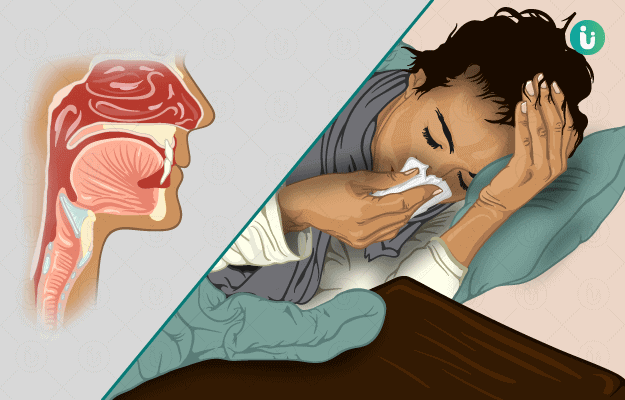What is upper respiratory tract infection (URTI)?
Infection of the upper respiratory tract, which comprises of the throat, the nose, and the larynx (voice box), due to bacteria, fungi, or a virus is termed an upper respiratory tract infection (URTI). Some of commonly occurring URTIs are sinusitis, rhinitis, laryngitis, and pharyngitis. Most URTIs are mild, but few cases of URTIs need medical intervention and can progress to severe infection if left untreated. The respiratory tract is a common and easy target for infections, as it constantly comes in direct contact with air-borne microbes.
What are its main signs and symptoms?
The main signs and symptoms of URTIs are based on the type of virus or bacteria that has caused the infection. Following are some of the symptoms seen in commonly occurring URTIs:
- Headache
- Stuffy or a runny nose
- Body pain
- Fever
- Fatigue
- Cough with or without phlegm production
- Difficulty in sleeping
- Sneezing
- Sore throat
- Chest pain in rare cases
What are the main causes?
The main causes of URTIs are as follows:
- Flu
- Common cold
- Seasonal allergies or climate changes
- Having direct contact with an individual who has a URTI
- Inhaling sneeze and cough droplets that contain a virus like influenza virus, rhinoviruses, coronavirus, etc.
How is it diagnosed and treated?
Most URTIs are diagnosed based on the symptoms reported by the patient. Tests like Rapid Antigen Detection test (RADT), Heterophil Antibody test, and IgM antibody test are ordered to find out if virus or bacteria are the causative factors.
Common treatments provided for URTIs are:
- Antihistamines and decongestants are prescribed to reduce nasal secretions and sneezing.
- Saline gargles are prescribed to soothe a sore throat.
- Antibiotics and antivirals are prescribed to treat URTIs caused due to virus or bacteria such as pharyngitis.
- Over-the-counter medications like lozenges and nasal saline drops, using water provide relief from sinusitis.
- Warm beverages like tea and soups help soothe a sore throat.
- Pain relievers like acetaminophen are also given to provide pain relief.

 Doctors for Upper Respiratory Tract Infection (URTI)
Doctors for Upper Respiratory Tract Infection (URTI)  OTC Medicines for Upper Respiratory Tract Infection (URTI)
OTC Medicines for Upper Respiratory Tract Infection (URTI)


















